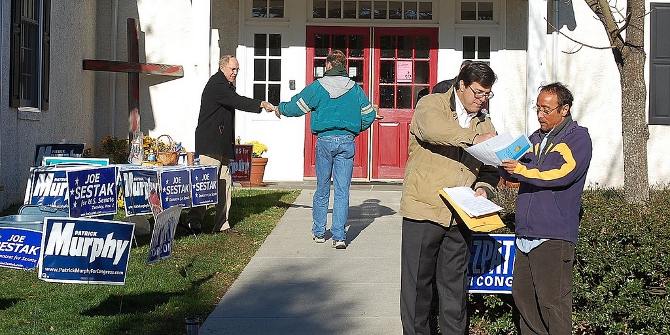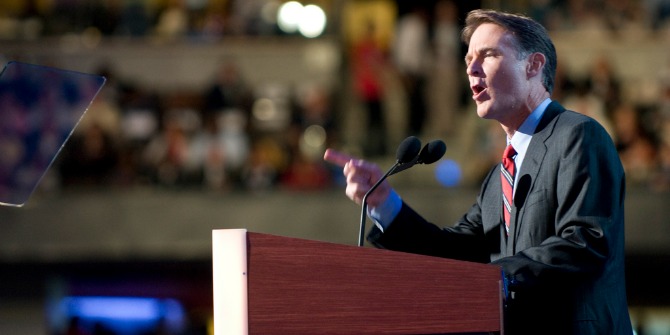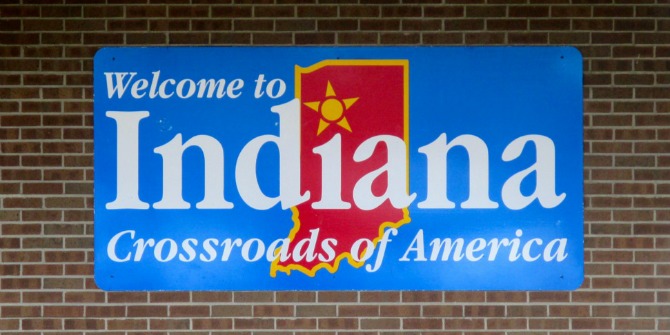 In a traditionally Republican-leaning state, former Democratic Senator Evan Bayh’s bid to get his old job back now means that Indiana may be competitive for the Democrats in the Hoosier’ State’s US Senate election this year. As part of our series on this year’s key Senate races, Andre P. Audette writes that Bayh may not face an easy race. GOP Congressman Todd Young has been relatively insulated from any negative effects flowing from having Donald Trump at the top of the ticket, and Bayh has already faced accusations that he no longer maintains his Indiana connections.
In a traditionally Republican-leaning state, former Democratic Senator Evan Bayh’s bid to get his old job back now means that Indiana may be competitive for the Democrats in the Hoosier’ State’s US Senate election this year. As part of our series on this year’s key Senate races, Andre P. Audette writes that Bayh may not face an easy race. GOP Congressman Todd Young has been relatively insulated from any negative effects flowing from having Donald Trump at the top of the ticket, and Bayh has already faced accusations that he no longer maintains his Indiana connections.
The highest profile races in Indiana in the 2016 election cycle were both defined by sudden changes to the ballot: the gubernatorial race when Mike Pence (a Republican) left the race to run as Donald Trump’s vice president, and the senatorial race when former Democratic Senator Evan Bayh shocked Hoosiers by jumping into the race at the last minute, replacing Baron Hill as the Democratic nominee. The latter race promises to be hotly contested as control of the US Senate hangs in the balance. Bayh’s entrance changed most political rankings of the Senate seat from “safe Republican” to a toss-up or even leaning Democratic, which is reflected in most polls showing Bayh leading his opponent, Congressman Todd Young, by a comfortable margin. While Bayh brings name recognition, experience, and a full campaign war chest to the table, his campaign has also struggled with defining the narrative of the race and maintaining consistent momentum in a Republican-leaning state.
Evan Bayh: Democrats’ Dream
Indiana Democrats have long pined for an return to politics by Evan Bayh. In 2010, Bayh offered a shock of a different kind to his party, deciding to retire from his Senate seat the day before nomination signatures required to be on the primary ballot were due. Bayh left the race with over 9 million dollars in campaign funding, an amount which would sit around waiting until his next run for office. Democrats knew that that money and his wide name recognition would make him an instant contender for whatever race he chose to run in, should he reenter the political arena.
Bayh’s family has a long history of service in the Hoosier state; his father held the same Senate seat nearly two decades before him. Evan, aside from serving in the Senate, has also been Indiana’s secretary of state and governor. Because of his success in a red state and national security credentials, Bayh was widely viewed to be a contender for the Vice Presidency in 2008, coming in second to Joe Biden. After being out of office for 2 years, Bayh also turned down a gubernatorial run against Mike Pence in 2012, much to the chagrin of the state party. It was no surprise, then, that establishment Democrats were elated to see him enter the race to reclaim his Senate seat.

Evan Bayh Credit: studio08denver (Flickr, CC-BY-SA-2.0)
Todd Young: Model Republican
Republican candidate Todd Young’s career in elected office began much more recently, in the Republican wave of 2010. Without Bayh’s announcement, that race would have served as a foreshadowing of this year’s Senate campaign: Young defeated incumbent Democrat Baron Hill to become the representative for Indiana’s 9th Congressional District. As a former Marine and member of the House Armed Services Committee, Young is also viewed as holding legitimacy on national security issues, an important campaign talking point in a year when combating terrorism and ISIS is near the top of voters’ minds. With a consistent conservative voting record and a relative lack of controversy, Todd Young became the darling of the state Republican Party by 2016, easily defeating fellow Congressman and tea party candidate Marlin Stutzman in the GOP primary in May.
Young’s Senate candidacy has been boosted by a number of national Republicans, including George W. Bush and House Speaker Paul Ryan. The US Chamber of Commerce, Koch brothers group, and several other independent groups have also poured money into the state supporting Todd Young. On the other hand, the national context of presidential candidate Donald Trump has not become a major issue in the race; Trump decisively won the Indiana primary and is expected to do well in the state this fall. Unlike other Republican politicians concerned about negative down-ballot effects from Trump, Young appears relatively insulated and may even benefit from having Trump at the top of the ticket.
“Define Your Opponent Early and Don’t Let Your Opponent Define You”
Evan Bayh’s comeback as a hometown hero was short lived; his early campaign was rocked by allegations that he may no longer be maintaining his Indiana connections. Though he holds legal residency in the state, his neighbors have suggested that they rarely see him around and that he prefers to spend his time in his two Washington D.C. homes. Culminating in a campaign gaffe where Bayh incorrectly stated his Indiana address, Republicans and conservative groups pounced, using the accusations to fuel a narrative that Bayh is a consummate D.C. insider and lobbyist in a year where political outsiders have found unusual success.
Bayh, meanwhile, has taken an unusual approach as a Democratic candidate, working to define himself as a “fiscal conservative, bipartisan leader.” Bayh emphasizes conservative issues like national security and government spending, attempting to make the race a referendum on experience and “Hoosier values” instead of an ideological divide. In an age of polarization, however, it is unclear whether a moderate message will be enough to convince Republican-leaning swing voters to cast their vote for a Democrat. Indeed, some Democrats are now casting doubt as to whether Democrats will be able to overtake the Republican majority in this election cycle.
Between the two candidates, neither has centered on a consistent message to define the narrative of the race. Hoosiers shouldn’t expect this to last, however; with millions of dollars flooding the state in ad buys and outside interest in the race at a new peak, the candidates and parties will be working overtime to try to define themselves and their opponents.
A Crossroads for the Future?
Indiana’s tagline “the Crossroads of America” is an apt metaphor for the Bayh-Young showdown. Bayh’s campaign will be a test of whether moderate Democrats, like Indiana’s other senator, Joe Donnelly; will continue to find success in conservative states. Recent rises in polarization have seen family-name Blue Dogs fall to conservative challengers in other areas: Mark Pryor in Arkansas, Mary Landrieu in Louisiana, and Mark Begich in Alaska in 2014 alone. Could Indiana be the next crossroads in the polarization of Congress? Evan Bayh may be Democrats’ last best hope of retaking this Indiana Senate seat for years to come, while two strong candidates search for a way to market themselves in a truly “purple” race.
Please read our comments policy before commenting
Note: This article gives the views of the author, and not the position of USApp– American Politics and Policy, nor of the London School of Economics.
Shortened URL for this post: http://bit.ly/2ci2292
______________________
 Andre P. Audette – University of Notre Dame
Andre P. Audette – University of Notre Dame
Andre Audette is a postdoctoral fellow in the Department of Political Science at the University of Notre Dame. His research focuses on political inequality and identity politics, and his dissertation work examined the role of churches in mobilizing or demobilizing Latinos for political action.







I always wished Dan Quayle would run for the Senate again, instead of vegetating or whatever else he’s doing – or not doing.